#Also Armageddon IS various characters throughout the story just in different bodies. One of those alter egos is the one who runs the
Note
who’s an OC you haven’t shared on here before :0?
ahhhh a bunch 😭 mostly because I have almost nothing on them.... But I'll pick one that is REALLY IMPORTANT yet barely developed. Sad!
So I think in other posts I've mentioned there's a titan beneath the colosseum? Yeah well those are "doomsday" titans, much, MUCH bigger than regular titans, practically country or continent sized. Got a bit inspired by iaconus from cbv as in these were buried a loooong time ago, being akin to gods. These titan's city speakers (and city speakers in general) disappeared, either because they went into hiding, jail, stasis lock or they just were killed sometimes 💀 in fear that they'd try to reawaken these titans. There's some prophecy or whatever of them waking up once again, destroying Cybertron and a whole lot of other planets in a struggle for power, but because of how much time has passed, this had pretty much been completely forgotten, spoken of as myths at MOST. There's around seven of these? And most of them are underneath MASSIVE cities since valuable minerals always surround them, as well as some odd energy that can be used to power up shit yadda yadda. They're technically dormant, but not fully powerless, as their influence can still take hold of feeble minds.
One of these rotten minds is an odd bot. Not quite an outlier, but not a regular mech at all either. Granted the ability to completely shape shift into whatever body he wishes, he goes by many names, but let's call him Armageddon. I'm still figuring out how he stumbled upon (one of. Maybe) the titans, and also WHICH one, but long story short, they promised power and glory. His mind was corrupted; after all, only city speakers can converse with titans. A destroyed world was a promise to start anew (he's just some doomer wacko and insane. think of the cultists from Dredge) with him as everyone's saviour and new chance of course, a loyal servant to the titans. Little by little, he's been looking for clues and pulling strings to awaken the titans and fulfill this prophecy, bringing in other impressionable and easily persuaded bots, always with the same promises: an end to the wretched today, and a chance for a fresh start, a clean slate tomorrow... Of course, there not doing all this thinking by themselves. Many swear they can feel something at the back of their minds, tugging at their thoughts
#Ask box#As you can see he has a very. Skewed perspective lol#LISTEN I THINK. TITANS COULD BE VERY COOL AND FREAKY#Also they ooze this like. Oil. Actually one of the Titans was badly injured. Where it fell it's blood spilled#And anything it touched was turned into a barren wasteland#Hell an entire section of the planet is almost completely inhabitable because of that titan#Also Armageddon IS various characters throughout the story just in different bodies. One of those alter egos is the one who runs the#Colosseum because like. It's right atop a titan so why wouldn't he#Also this ooze can grant some power. With a cost of course. There's a reason quinacridone has been king for so long#And why his ambition is a bottomless pit#Never full never satisfied#There's probably sooooo many typos bt typing on my phone from browser Tumblr is always so annoying#Also my projection moment here. I grabbed a bit from Armageddon's mindset with how uh... christians (at least the ones I was raised with lo#See the end of the world which definitely did shit to me but I can use that for stories now so 👍
6 notes
·
View notes
Text
Newman’s Nook: What’s in a Name?
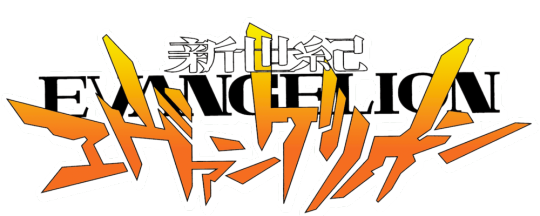
I first watched Neon Genesis Evangelion as an 18 year old, new to the anime medium. Bright-eyed and bushy-tailed, I was just enthralled by all the large-scale combat between the angels and the Eva units. With the series dropping on Netflix, I decided to re-watch the series in 2020. Let me tell you, now as a Dad in his thirties, my focus shifted from the action toward the themes of depression and acceptance, instead, as well as to the heavy use of Christian symbolism. This got me to wondering something—what’s the deal with the name of the series? So, I decided to dive further into the meaning behind the name and what I found was interesting.

Neon
Neon is one of the basic elements of the periodic table of elements. However, that’s not the “neon” being described in the title of the series. This iteration of neon is akin to the English language prefix neo. Both the prefix and this “neon” have their roots in the classical Greek word “neos.” Neos generally translates into English as new, fresh, or recent. We see this prefix used in English in words such as neonatal (location of new birth), neoliberalism (modern liberalism), or Neolithic (literal meaning “New Stone Age”).
So, from a literal word root perspective, the first word in the title can basically be inferred to mean “new.”
Genesis
Genesis is a bit of a loaded term. Christians and Jews will recognize it as the first book of the Pentateuch or the first of the “Books of Moses” in the Bible. From a Biblical perspective, it is the beginning.
Merriam-Webster defines “genesis” as, “the origin or coming into being of something.” The genesis is the origin or beginning point of something. In the Biblical sense, that’s the beginning of all things as well as the beginning of scriptural canon. In a cultural context, the SEGA Mega Drive was branded as SEGA Genesis in the United States, as Sega of America wanted to convey in the name that the console was a “new beginning” for gaming.
From a title perspective, it appears that “genesis” in the title has something to do with a beginning or origin point. So far, we have “new beginning” as a general translation of the title.

Evangelion
Evangelion is a difficult word as it does not exactly have a direct translation. In the English language, its roots are similar to the Christian terms, evangelical or evangelism. Both of these words as well, as “evangelion” itself, have their roots in the classical Greek word euangelion. In most modern translations of the Bible, this has been transliterated into classic English as the word “Gospel.” In it’s classical definition, euangelion means “to bring good news.” In a very literal breakdown of the classical Greek word, euangelion is broken into the the two parts: “good” (eu-) and “messenger” (ángelos). This form of the word generally shifts from a meaning of good messenger to good message or news.
What becomes interesting then is that the term used throughout the series as applied to the biological-mech fusions that are used to defeat the angels is “Good News.” The angels in the series are, in a sense, being defeated by good news.
How does it apply to the anime?
Now I know what you are thinking: “That’s a real fine name you got there; however, how does this very specific name apply to the anime?!?” Let’s dive in.
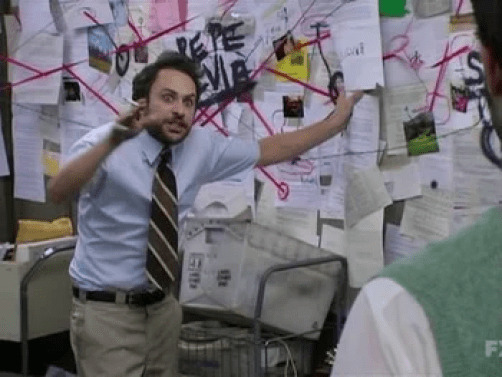
The plot of the series is about a group of teenagers who pilot humanoid-machine hybrids (cyborgs) known as Evangelions. Each of these teens are literally piloting “good news,” employing the Evangelion units to defeat monsters known as “angels” that are trying to destroy the world. Simultaneously, much of the series involves the various characters dealing with their own personal struggles, with a major focus on depression. The series ends with a new beginning for Shinji and Asuka after the Third Impact and implementation of the Human Instrumentality Project.
In essence, the plot lends itself to a series of new beginnings (Neon Genesis). There are simple new beginnings, such as when Shinji or Asuka arrive in Tokyo-3. There are also incredibly complex new beginnings, such as the End of Evangelion film, where the world is remolded with Shinji and Asuka serving as the proverbial Adam and Eve.
In another more literal sense, the “good news” of world peace is provided through the advent of a different new beginning from Human Instrumentality. As all sense of self is taken from humanity through instrumentality, peace is achieved in a new, united beginning. While it is debatable if this beginning truly is good, it is in fact, a “Neon Genesis.”
Professor of Media Analysis, Mick Broderick, wrote a detailed analysis of the series and came to a conclusion that the series serves, in many ways, as a retelling of the Book of Genesis. He writes, “Anno’s project [Neon Genesis Evangelion] is a postmodernist retelling of the Genesis myth, as his series title implies—Neon Genesis Evangelion. It is a new myth of origin, complete with its own deluge, Armageddon, apocalypse and transcendence.”
However, there’s another school of thought on the title of the series. Hideaki Anno has said on a few different occasions that part of why he pulled in the Christian and Jewish mysticism symbolism was because he thought it was unique and interesting. While the name may derive a meaning from an analysis of the series’ plot, there is also a very distinct possibility that the true reason this series was named Neon Genesis Evangelion was purely because Hideki Anno thought the name was neat.

How do Christians respond?
For non-Christians, the title and the series symbolism can provide entertaining and educational value, but for Christians, we may be called to respond: What do we do with Neon Genesis Evangelion?
Now, I could post a barrage of links of various thought-pieces across the internet about the series. Instead, though, I want to bring us back to the beginning. What is this series really about and what’s in that name?
There are flashes of religious symbolism across Evangelion. Names of beings and entities derived from Jewish, Gnostic, Christian, and Islamic mysticism are scattered throughout. Crosses are commonly shown, and the topic of the soul as a separate entity from the body is discussed. However, the series has little or nothing to say about the nature or reality of God or Christ. Instead, it’s a very human narrative that focuses heavily on the depression of its main character, and with a human solution on solving the suffering caused by humanity. In many ways, this is the reason behind the Human Instrumentality Project, which again is a means whereby all the souls of humanity are merged into one and combined into a single, physical being.
Instead of having individuality, there would be sameness.
Instead of unique consciousness, there would be oneness.
The Bible embraces notions of unity, but rejects notions of sameness. Never is that more clear than in 1 Corinthians 12, where the apostle Paul discusses that idea of the church being united as the body of Christ. However, in doing so, he rejects the idea that individuals have the same purpose, instead uplifting the unique characteristics that make us different. I have different spiritual gifts and talents than you and you have different spiritual gifts and talents than your neighbor. Some of us are gifted teachers, other brilliant public speakers, and others are good cooks. Each of those unique characteristics are important and make us who we are. The Lord loves us as we are.

A similar emphasis on individuality finds its way into the end of the Evangelion series, which finds Shinji rejecting the concept of instrumentality. While all others appear ready and willing to join into one, united consciousness, Shinji desires to remain unique. Despite his flaws, despite his pain, despite his depression, Shinji recognizes that he is loved and deserves said love.
In a way, there is good news in the series in the form of Shinji’s eventual recognition that he deserves love as well as the individuals recognizing their desire for unity. Well, good news depending on your perspective.
Conclusions
With that in mind, consider these concluding points in deciding how to respond to the series as a Christian:
While recognizing that there is much symbolism throughout the the show that partly reflects the Christian faith, Christians should also acknowledge that said symbolism is mostly meaningless in that it does nothing to really explain what we believe. It is mostly window dressing.
Accept this story as a human narrative about human experiences trying to seek the divine to deal with their own problems. While on the surface, the story portrays humans protecting the world from monsters with their own monstrous, giant cyborgs, a deeper thematic dive reveals the truth of how depression terrorizes individuals and the challenges and ways one may respond to it.
Take away the idea that depression is real and a support system is important.
Unity is important and good, but is distinct from sameness, an idea that can easily find its way into churches and church culture We must embrace our uniqueness.
Christ’s Good News is better than any good news of Neon Genesis Evangelion. The oneness of Human Instrumentality pales in comparison to unity in Christ.
But don’t just take my word for it. There are layers upon layers in Neon Genesis Evangelion and two people may watch it and glean wildly different things from the series. Watch it yourself and feel free to comment below on how you feel Christians should approach this landmark show.
=====
Neon Genesis Evangelion can be streamed at Netflix and is available for purchase on Amazon.
#Anime#Christianity#Shin Seiki Evangelion#Neon Genesis Evangelion#Newman's Nook#Articles#Author: MDMRN
6 notes
·
View notes
Text
Sinnerman: A not so Mini meta post anymore...
Due to my time restrictions but my desire to write this I decided that a quick meta post was in order before the weekend and certainly before 3x02. Yet be warned that this might turn a bit longer that I expect to myself...
We have several clues on who Sinnerman might be and the good thing is that we can think outside the box with Lucifer the show. This is not Supernatural and so we have a mythos to rely on which comes from 150(!) comic-book/graphic novels!
So let’s begin with the clues from the interviews:
What makes the Sinnerman a different kind of antagonist than ones we’ve seen before?
Modrovich: He’s a badass. But what you also find is that he does have a hidden history with some characters in our show that come out and Lucifer has to face off against.
Henderson: We look at him like a bizarre reflection of Lucifer. We learn in an upcoming episode that he also gives out favors, but his are a little bit more nefarious. When this guy gives out favors, you’re really dreading the payment that you’ll have to give. So it’s sort of the Devil facing a dark reflection of himself.
What can you say about the Sinnerman’s intentions in kidnapping Lucifer?
Henderson: The Sinnerman’s the kind of person who knows that putting angel wings on the Devil will only drive him deeper in the other direction. So Lucifer, whether he likes it or not, is being manipulated.
Modrovich: And that Sinnerman has a motivation in taking Lucifer into the desert that’s other than the wings. He has this specific motivation that we will reveal to you throughout the entire season. He has a personal reason.
“Our friend Lieutenant Pierce suggests to Lucifer that he knows about the Sinnerman and they start to collaborate together in this tangled web that we weave in Season 3,” Ellis reveals to TV Guide.
HENDERSON: Yeah, and at the end of the first episode, we get this first clue as to who this person might be, and realizing it might be a darker force than he’s encountered previously.
To Summarise the above Sinnerman:
1) Has hidden history with some characters in our show - Meaning more than one. Pierce for sure but also Lucifer apparently.
2) We look at him like a bizarre (dark) reflection of Lucifer - Is that even possible to be darker than Lucifer himself I will say yes because I have a few theories on that but you will have to scroll further down for them.
3) He gives out nefarious favours with high stake payments - This alone gives us a hint on what or who we are looking for.
4) Sinnerman knew how to give Lucifer his wings and that it would cause Lucifer to act in a certain way - Meaning not only he has the knowledge of how to handle and manipulate divinity but also knows Lucifer... Really knows Lucifer...
5) Sinnerman gave Lucifer his wings for a certain reason which Henderson might have revealed above. He has a personal reason to do that... - This info again limits the suspects quite a lot but never ever forget that this is not a show based on the angels we know but its foundations are in a mythos woven by Sandman and Lucifer the comics...
6) Finally, Marcus Pierce will have to admit that he knows about Sinnerman which will lead to a weird partnership with different agendas between Lucifer and Marcus.
7) It is given by Henderson as a darker force Lucifer has ever faced before...
What we know from the show and most importantly 3x01:
(At this point of the post I realised it was never meant to be a small one *sigh*)
He was just a routine gig.I was gonna swap him for you, but when I went to pull you out of the van, you you had friggin' wings, man!
What we know from the kidnapper is that he just had to get him out of the van not that he actually kidnapped him! So that means that we may have a three-act play.
Lucifer when he is contemplating how he was kidnapped he says “...-how were they able to render me unconscious? Either they used some kind of celestial weapon, or the detective was nearby.”
He never thinks that there might have been a celestial being but we saw the weapon they used so we should at this point leave out Chloe’s presence near the hospital out of the picture and focus on that the kidnapper might have indeed used something of celestial origin... As we know from the piece celestial toys were left on earth along with a Summerian (Assyrian really...) manual...
The second is how did he get his wings? Well, here we have again Lucifer’s reasoning to play with although I don’t agree with that much it gives me again hint: “Did my Father give you some kind of totem? A talisman? - What?”
At this point, the writers through Lucifer give us another good hint and it is closely connected to the next quote but seriously think about it... In Lucifer’s reasoning, an object can hold mystical powers enough to give him back his wings. In not so many words, magic is getting into the Lucifer (Tv Show) mythology finally... Divine power is one thing but infused and transportable as magic can be a complicated notion to conceive and handle yet...
And I don't know your dad. Unless, is your, is your dad the Sinnerman?
I was rewatching that scene but I wonder if the guy had made the connection with Lucifer’s insistence that some kind of dark magic for the lack of better word was in the mix. Funny... because why would a man who knew Sinnerman assume so easily that a feathered Lucifer could be the son of Sinnerman if Sinnerman did not hold a certain unearthly charisma himself? Of course that’s just speculation.
Finally, in 3x01 even Lucifer acknowledges that:
At first, I thought it was a an emissary on Earth working on Dad's behalf, but then, the more I think about it, the more I think maybe this isn't our Father who art in Heaven at all. But something much, much darker.
The above is actually a pretty good connection link to the comics... But anyway Lucifer says this is something much, much darker and Amenadiel’s expression was giving away something the first time I watched the episode but I cannot be sure. Still, Amenadiel’s not so obvious reaction had me thinking that as the firstborn in the show he preceded Lucifer and knew quite a few things from an era before the light aka Lucifer was born... Although we do know that Mum had the same power aka to illuminate the universe...
A clue from Twitter yesterday from Ildy had me thinking again of the usual suspects but you have to be aware of something. I can only speculate on comic characters or characters that may be based on the comics. Certain elements from the show appear on and off in the tv series like the “space vagina” That was actually taken from the first issues of Lucifer and is shown near the end as well.
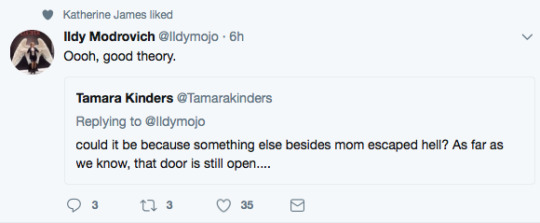
So Ildy says that something might have indeed escaped Hell... Hmmm... What we can also speculate is that as Marcus is hunting down Sinnerman, this season’s bad guy only recently found his way to L.A. but the second season would have been enough for him to grow out of favours and establish a mob persona strong enough to get to L.A. and target Lucifer when Mum was gone...
We might even suspect that Mum was but a diversion for Lucifer, Sinnerman created for him to make sure he was safe before he started plotting.... Of course, we cannot speculate everything. I’m sure that the writers have come up with some crazy and absurd details I cannot speculate about but that’s the thing, I can get to the comics and try to see who the usual suspects might be...
Right now I have two comic book, inspired perhaps than transferred from the comic book universe to the show, characters that might be Sinnerman. And then a third speculation...
The first but not the best candidate for Sinnerman’s real identity is Dumas. I’ll just copy paste his info here:
Duma is a fallen angel from the DC Vertigo series The Sandman. Before The Sandman
Duma's name means "silence", and he is based on the angel Duma from Jewish mythology. In those tales, he is the angel of silence and death's stillness. According to these same stories, he is the guardian of Egypt and the prince of vindication. Based on this, one could speculate that he was the angel who killed the firstborn Egyptians in Moses' time. Some sources also name him a "Prince of Hell".
The Zohar, a book of Jewish mysticism, describes his position in Hell as such that he had "tens of thousands of angels of destruction" under him, and that he was "chief of demons in Gehinnon with 12,000 myriads of attendants, all charged with the punishment of the souls of sinners."
Dumah is also the name given to the guardian of the 14th gate, through which the goddess Ishtar passed on her journey to the underworld in Babylonian mythology. Dumah may or may not be related to Duma.
In The Sandman
In Season of Mists, we find that Lucifer has closed down Hell in frustration, and given the key to Dream. Eventually, after much squabbling between various gods, Duma and Remiel are assigned to assume control of Hell, and Duma accepts this.
After The Sandman
Following the end of The Sandman series, Remiel and Duma lose ownership of Hell in the Lucifer spin-off series. Duma eventually allies with Lucifer and Elaine Belloc to save creation, and persuades Hell's new ruler Christopher Rudd to bring his army to Heaven's aid at the Battle of Armageddon.
The second and the one I’m rooting more than Duma is The Silk Man...
Appearing for the first time in Lucifer: Nirvana, The Silk Man is an immortal sorcerer, described by Lucifer as
"..a fossil remnant from an earlier, cruder creation. His body is a weaving that has to be renewed constantly. His spirit too, come to that. A messy form of immortality, but it seems to do the job." In earlier days he was the leader of the Arao Jinn. He appears as a mercenary, hired by the angel Perdissa to kill Lucifer. He seems to need to consume living things to stay alive, weaving them into himself. He is severely damaged by Perdissa and eventually killed by Lucifer.
The Silk Man seems to be closely connected to my third speculation and as such it might be a merge of the two... In the comics, God admits that he was created by an external force and we do know that darker things lying around the cosmos and outside The Creation... Darker, twisted and defeated by Dad... Still, where would all these defeated “things” go? In Hell I suppose...

Following a mythology of Zeus and how he enprisoned the Titans under the Earth, we can say that this is a popular mythos to follow with one crucial flow. What precedes you have the knowledge of how to overpower you in time... Amenadiel might have been around at that point and might had to help Him to get rid some of them Sinnerman included..... Now The Silk Man was killed by Perdissa... But I suspect that Lucifer’s light bringing power which freed Mum might come back for that task... If you need more info about that just read Lucifer: Nirvana. Lucifer Issue 75 also has a good interaction of our hero with The Sillk Man as well though....
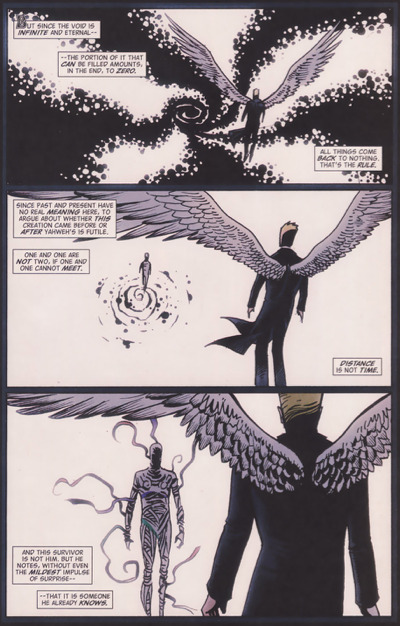
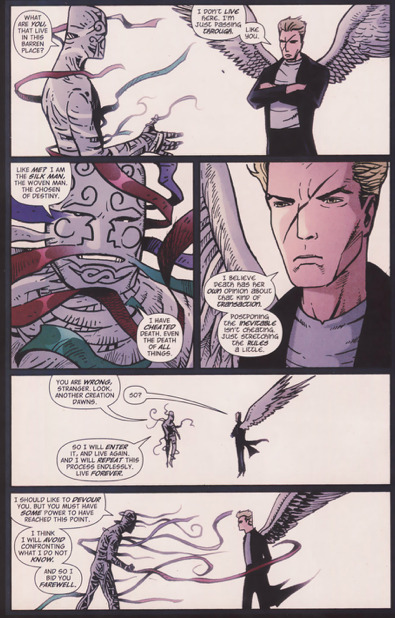
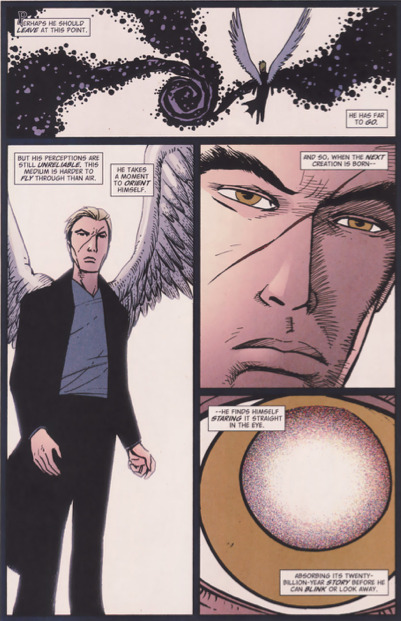
Anyway to finish this post... I do not believe that Sinnerman is a mere human but at the same time I cannot believe he is a celestial being at least not in the sense we have known them to be in the tv series so far. So perhaps an external force whch we know they exist from the comics? Perhaps... Let’s not forget that the Sinnerman as a casting role is new so I doubt we will see for example Malcolm back or anything of that nature in our screens soon but to the ones who want to learn more about the external forces I’ll just leave you with Carey’s two answers on that matter on Twitter...
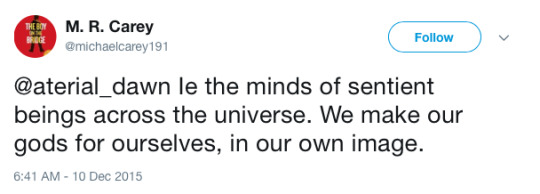

The Dream of a Thousand Cats is a darkish one... The allegory in that story where cats once ruled over people only for the past to change goes beyond your usual comic book standards (even for Sandman in my opinion) and the fourth wall sometimes shutters but it is what it is....
As the episodes come rolling I’ll probably change my conviction over who Sinnerman is but until then this post will have to do... I apologise for its length :P
#lucifer season 3#lucifer spoilers#lucifer 3x01#lucifer meta#lucifer speculation#Sanoiro just being crazy as usual#sanoiro ranting again
51 notes
·
View notes